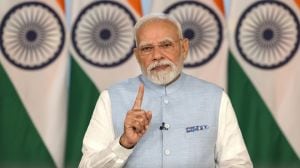Open lessons: Padraig and Sergio get new perspective after last year’s playoff battle
The tall Irish golfer had just rounded the corner behind the clubhouse at Royal Birkdale Golf Club when he stopped like...

The tall Irish golfer had just rounded the corner behind the clubhouse at Royal Birkdale Golf Club when he stopped like a wedge shot into a soft green. Brought up short by the sight of two reporters walking his way, Padraig Harrington, the defending British Open champion, made a decisive U-turn and began retracing his steps, looking for a convenient doorway.
This hasty retreat was not because Harrington, normally garrulous and accommodating, was trying to dodge questions about his injured right wrist or had turned into some sort of diva in the year since he won the British Open at Carnoustie in a playoff with Sergio García. If all the fame and accompanying adulation heaped upon him after he became the first European in nine years — and the first Irishman in 60 — to win the Open has had any lasting effect on Harrington, it might have been to make him a more thoughtful person.
This was all about time management. Harrington, 36, had to learn fast about the pitfalls of giving too much of it away during the past year.
“There’s nothing I would change in terms of being the Open champion,” Harrington said. “There was a period just before Christmas where I overdid things. I did far too many interviews and far too much, and I really was fatigued. I got sick at the start of this year with shingles again, a sign of stress and fatigue.
“But I wouldn’t give it up. That’s all part of being the Open champion, winning your first major. It’s fantastic.”
For the 28-year-old García, the result at Carnoustie and the year that has followed have also been invaluable, providing him perspective and a newfound determination to persevere.
No getting away
After Carnoustie, García immediately flew home to Spain to collect his thoughts and make some decisions.
His missed putt has been replayed countless times on a British Open film loop that has been running on jumbo screens in the news media center at Royal Birkdale for the past two days. While Harrington was speaking, it was playing. When García arrived for his interview, appropriately right after Harrington’s, the putt had just missed again.
This could explain why Harrington and García were asked about whether they had considered what would have changed about their lives if the putt had moved an eighth of an inch to the right and fallen in the cup.
García responded that he simply did not know how his life would have changed. “I don’t know,” he said. “I will never know.” When pressed, he added: “It’s all speculation, so I really don’t know. I’ll tell you next time I hit it, I’ll hit it a little bit farther right.”
In his mind, he probably already has. But García, for all the pressure that has been applied by expectations, is still a young man. And he has made the kind of changes to his putting and short game that were necessary, seeking out Stan Utley, the short-game guru to numerous PGA Tour players in the United States. Utley persuaded him to begin putting the way he did when he was a fearless 19-year-old, and it has worked. García won the Players Championship in May.
Harrington’s reply gave much insight into his own views on the difference between winning and losing. Not long after turning professional in 1995, he won the Peugeot Open de España. Between that win in 1996 and his second victory four years later, he finished second 17 times. He has 30 runner-up finishes as a professional.
“I realise the difference between success and defeat, and all players have to manage that area of the game. Because when you do win, you’re put up on a pedestal and everything is great, and when you don’t win, it’s very easy to be cut down at the knees. To be honest, there’s not much difference.”
Photos



- 01
- 02
- 03
- 04
- 05



























